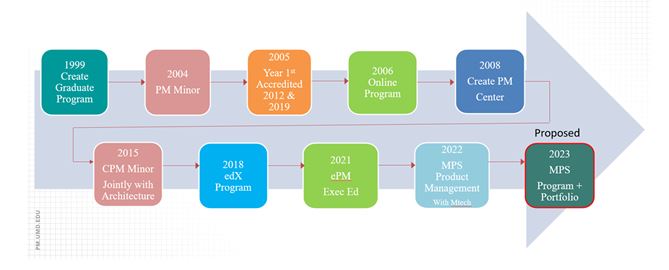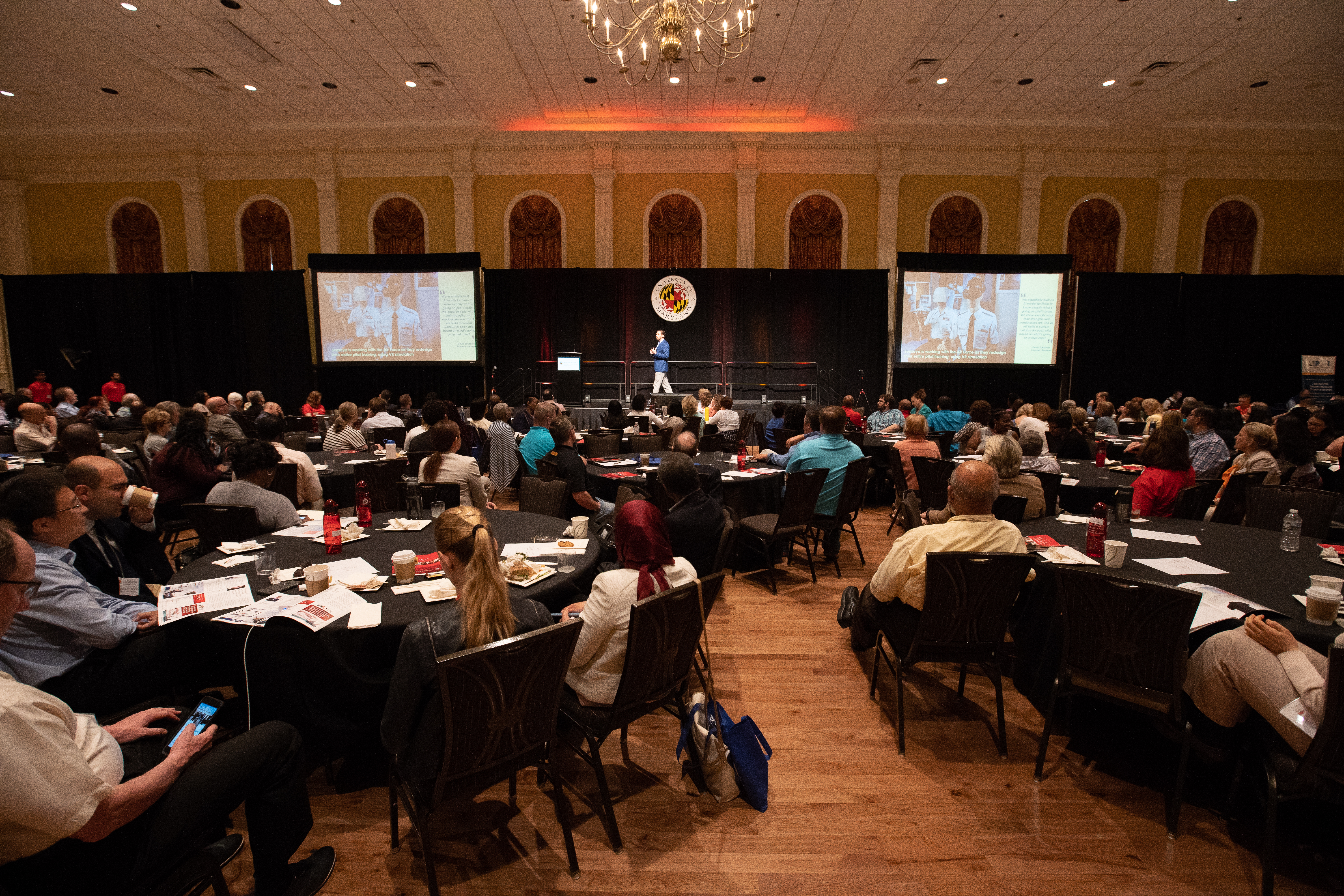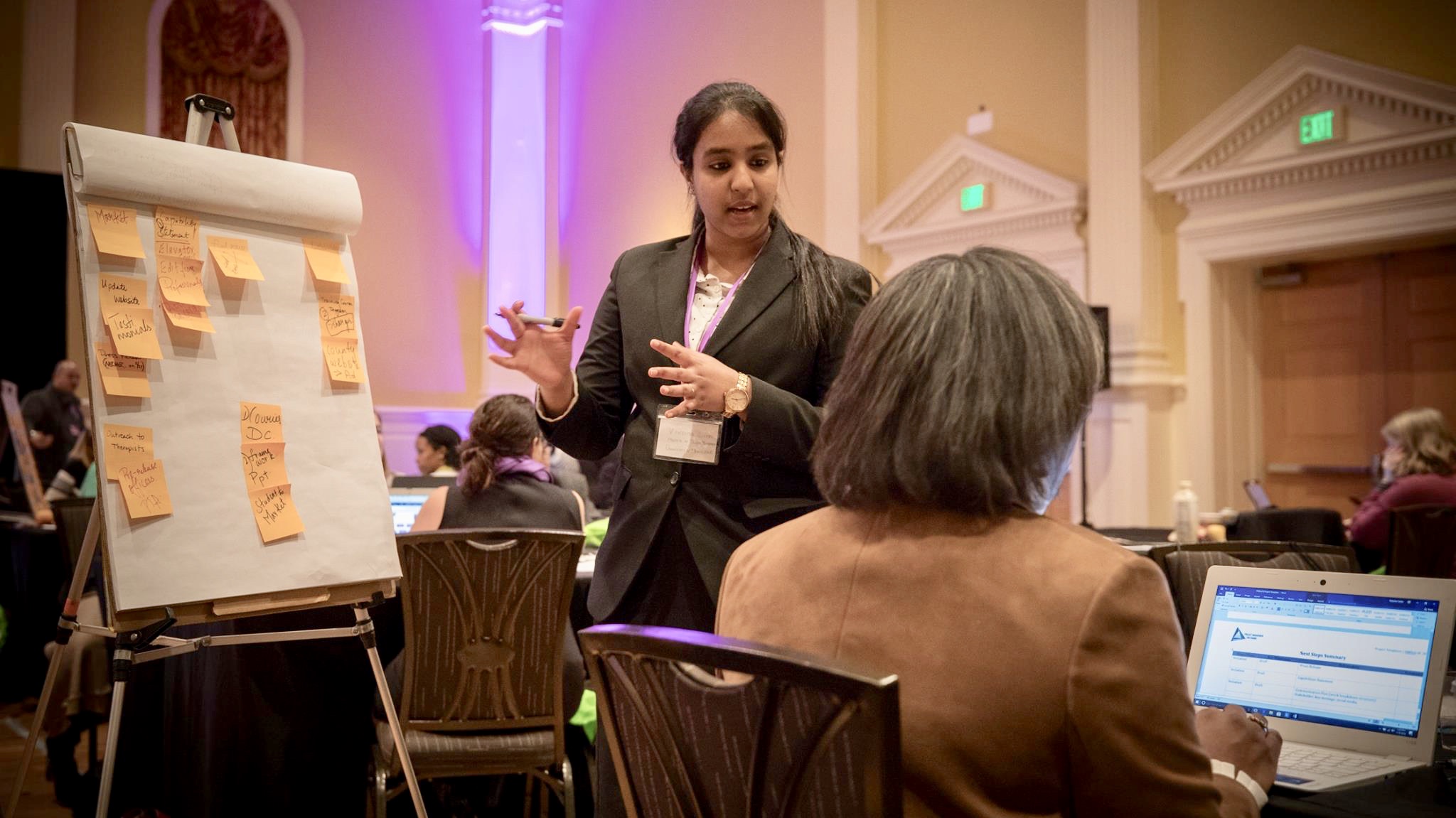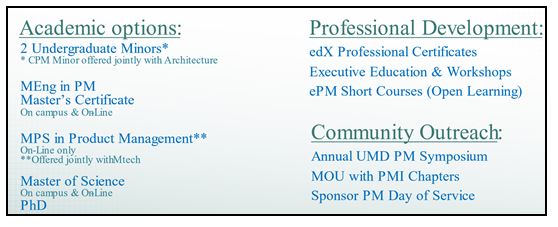Introduction
The Project Management Program has led the Civil and Environmental Engineering Department, as well as the Clark School, with online an at-scale education and pedagogy. Starting in 1999, the program began as a re-imagining of the Construction Management program that had suddenly lost its key fulltime faculty. The PM Program that replaced it has achieved incredible results leading education both at UMD and around the world.
The following graphic illustrates major milestones of program development. It highlights key developments including a new PM Minor, UMD’s landmark accreditation as the first engineering school with a PMI GAC-Accredited Master’s Degree, and the creation of a robust portfolio of academic degrees and professional development offerings:

This brief summary clearly demonstrates that we have built and are continuing to build a program that is broad and comprehensive and exceeds all initial expectations. We are on the leading edge of providing programs that meet both academic and professional (just-in-time learning) needs based on the latest knowledge and best practices.
Initial funding and payback
The Program was seeded by the Department with funding for the salary of a Director, Mr. John Cable. Mr. Cable, then a mid-career part-time graduate student taking Laufer’s courses, was recruited in 1999 to build this replacement program. Given severe budgetary constraints at the time and limits on faculty hiring, it was recognized this new program would have to be self-supporting. It could not rely on financial support from the department and could not rely on large numbers of new TTK faculty hires.
Professor Baecher was Department Chair in 1998 when the Program was conceived. He states,
“The Program was established to re-create an important educational function in CEE which had been suspended with the departure of all three faculty of the earlier Construction Program.
Given budgetary limitations, the concept was to re-create an educational program in the broader area of engineering management at minimal cost to the Department, and which would not require many new TTK faculty. The Program was created with this educational purpose and was not expected to generate profit.”
However, following the developmental phase of the program from 1999 to 2003 the PM program has supported itself and provided needed funds to support the Civil and Environmental Engineering Department.
The department would support Mr. Cable’s salary initially with the understanding that the investment would be paid back to the department once the program became self-supporting. As things turned out, the program became self-supporting quickly. Within 24 months the seed funding had been repaid to the Department, and within 48 months all costs of the startup (i.e., ongoing payments to adjunct faculty) had been paid back to the Department. Since that time, ca. 2003, no Department funds have been used to support any costs of the PM Program, except in the 2021 pandemic reduced income year, and in total the Program has transferred some $4 to 5 million of discretionary funds to the Department. None of those funds came back to the PM Program but were used for other Department expenses.
1999 Creation of the Master’s Program
John Cable was hired in August 1999 with the assignment to create a master’s degree in Project Management that was to be housed in the CE&E Department but was intended for the Clark School of Engineering.
The initial 10-course curriculum was developed in the fall of 1999 with the input of industry and faculty and advice of a five-member faculty group from the department. The initial concept was presented to the dean, Herb Rabin, and department chairs and received their complete approval. The university approved the program in January of 2000 and the first course was launched in summer of 2000.
2002 Creation of the Undergraduate Program
In 2002 the director was asked by the chair to develop and undergraduate set of courses which initially constituted a certificate and ultimately became the Undergraduate Minor in Project Management. The Minor has evolved to include 8 courses, 5 of which are required in the minor.
2005 Graduate Program & Undergraduate Minor Accredited
In 2005 the program was accredited by the Global Accreditation Center for Project Management Education. We were the first academic program resident in an engineering school to achieve accreditation. Re-accreditation occurred in 2012 and 2019. The on-site audit team had very positive compliments about the program and its faculty. In 2019 the second re-accreditation process was launched but due to the impact of COVID, it was not completed until November 2020. The auditor’s report cited the PM faculty as Distinguished.
2008 Creation of the Project Management Center for Excellence
In 2008, at the Dean’s suggestion, the academic program submitted a proposal to the College to become the Project Management Center for Excellence. This proposal was approved by the dean of the A.J. Clark School of Engineering. By that time the graduate curriculum had grown from the initial 10 course to @ 17 3-credit hour courses.
2014 Project Management Symposium Launched
In 2014 we launched the first UMD PM Symposium. This is a two-day annual event for academics and practitioners that has become the premier conference in the Washington metro area with participants from around the world. It is an opportunity for participants to share experiences and gain knowledge in key topics of project management, meet leading international experts in the field, build the project management community in the metropolitan Washington area, and strengthen their professional networks. Even more, symposium participants will gain insights into how the field of project management is changing as they delve into focus areas. Last spring 560 people participated.

2015 Creation of the Construction Project Management Minor
In 2014, at the request of Dean Pines, we worked with the dean of the School of Architecture, Planning, & Preservation, David Cronrath, to design an Undergraduate
Minor in Construction Project Management. This involved extensive input from industry and was approved in May 2015. It is jointly offered between CE&E and Architecture.
2015 MOU with PMIWDC Chapter of PMI
As a foundation of our Community Outreach program, we negotiated a memorandum of understanding with the Washington DC Chapter of the Project Management Institute (PMI), it is the largest chapter of PMI in the world with over 10,000 members. After several years of experimenting with different approaches to “spreading the word” about our Project Management degree programs we decided to focus on this Washington DC / Baltimore, MD region rather than placing ads nationally and supporting booths at the PMI national conferences. The agreement pulls together a variety of marketing activities that were being done independently into one agreement at a substantial discounted cost. It covers advertising in their Marketplace, Service Provider Directory, placing articles in newsletters, a prominent listing on their calendar of events, promotions on social media, and mobile app sponsorship. The relationship has grown to mutual advantage. We provide speakers to their monthly meetings and annual conference, and they are an active channel of information about the pulse and needs of the project management industry.
In 2016 we also signed an MOU with the Southern Maryland Chapter of PMI to support their initiative to open a PG County monthly meeting for their members in the county by providing space on campus for the meetings and providing speakers to the monthly meetings and the annual conference. They also provide input to the knowledge needs of the industry. We beta tested the content for our Agile series on edX with them.
2015 Launch of the Project Management Day of Service (PMDoS)
Working with the Project Management for Change, a 501 © (3) nonprofit whose mission is to raise the profile of the Project Management profession while furthering the missions of the nonprofits and charities in local communities, we sponsored the first PMDoS that was held in Northern Virginia. Since 2016, we have hosted the annual event on campus. The exception to that was in 2020 and 2021 when it was offered virtually due to COVID, but the center was still an event partner/sponsor.
The day of service brings project management volunteers together with nonprofits to define and scope a business problem that the nonprofit organization is struggling to address or complete. The project management volunteers are assigned to a nonprofit in small groups. The teams work with the nonprofit team to diagnose organizational challenges, then translate those challenges into an actionable scope of work and develop a work plan for the nonprofit.
The event has received outstanding support from the five Project Management Institute (PMI) chapters from the D.C.-Baltimore metro areas. These chapters believe that PMDoS is an extremely high impact and meaningful way to give back to the community using hard-earned project management skills and therefore recruit volunteer project managers to donate their time and attention to serve those who help others.

2018 First edX Certificate Launched
In 2018, at the request of Dean Pines, we launched a beta test in a Certificate in Mastering Agile Project Management on edX. The Agile Project Management series on EdX was highlighted as the #1 Professional Certificate for massive online open courses (MOOCs) globally by the premier MOOC reviewer Class-Central.com.
This highly successful initiative led to developing a proposal to launch 10 certificates (@50 courses) on edX. This proposal was approved by the department Chair, Chuck Schwartz and the dean, Darryll Pines, and in 2019 John Johnson was hired as the Strategic Program Manager to build the edX program.
These MOOC courses are self-paced, professional development offerings that are highly rated by edX learners. The edX micro-credentials are short, competency-based courses grounded in research and best practice and designed to be:
- Personalized: A learner can set their own pace and address skills gaps and career goals.
- Flexible: edX learners’ study when it’s convenient for them and return to an archived version of the course, even after completion.
- Performance-based: micro-credentials include a certificate pathway based on demonstrated mastery of the subject matter.
The programs on edX enable learners to use the knowledge and skills they gain in their edX courses to drive impact at work and grow their careers. edX courses are free to audit and sample; interested learners pay a nominal fee to pursue a verified edX certificate. As of the fall 2021, there have been 380,393 enrollments across these programs with 42,862 learners paying to become a verified, certificate pursuing learner, with 25,766 certificates being awarded. UMD programs have generated close to $6 million dollars in revenue.
edX has recognized the Agile Project Management program as exemplary. It was among top 10 edX courses in 2019, surpassing courses from MIT, Harvard, Caltech, RIT, Penn and many other top-tier institutions. Additionally, this program is regularly cited as a model program in edX training of new course teams and faculty getting started on edX.
2021 ePM Executive Education Program Launched
The Executive Project Management Program is developed to deliver long term solutions to the toughest project management challenges PM face today. Building on our in-depth academic content and the library of edX short courses we design custom solutions for corporate, government, and non-profit organizations to be on-demand education, where and when teams need it. This material is targeted specifically at the problems the organizations are trying to solve.
Executive Project Management (ePM) is the newest addition in Professional Development. The website, epm.umd.edu, serves as a content marketing location for both edX and new “Premium Short Courses” or “PSCs” that are not-for-credit workshops. These PSCs include instructor interaction and are faster paced than edX courses, with active learning and experiences that don’t scale. The FY22 Budget plans to pilot seven PSCs to explore this new premium adult learning market that can feed into the edX program as well as leverage already produced edX content.
2022 Master of Professional Studies in Product Management
In April 2021 the proposal for a Master’s in Professional Studies in Product Management (MPPM) was approved and is being launched with the first cohort starting in the fall 2022. The Project Management Center for Excellence and the Maryland Technology Enterprise Institute have partnered to create this highly multi-disciplinary degree to help fill the market gap of individuals ready to take on this vital and coveted role.
Product management is one of the fastest growing and most lucrative jobs available today. Companies have awoken to the desperate need for product managers to create products that customers love, that integrate design, functionality, and business solutions. Product management is seen as a launchpad for future CEO’s and startup founders in technology companies.
(2023) Master of Professional Studies in Program & Portfolio Management (In-Development)
Program Management is the application of knowledge, skills, and principles to a program to achieve the objectives and to obtain benefits and control not available by managing program components individually.[1]
Portfolio Management balances conflicting demands among portfolio components, allocates resources based on organizational priorities and capacity, and integrates management principles to align the portfolio and its components with the organizational strategy.[2]
The job of a program or portfolio manager is to help define strategic objectives and deliver the benefits of projects that realize those objectives by creating the environment within which good people can flourish. The degree focuses on preparing learners for the future of work that is digital, connected, agile and delivering value to the stakeholders.
This degree leverages the extensive insights and expertise of our senior lecturers and faculty and meets an emerging need to develop complex systems for large companies, non-profits, and government agencies. The proposal has been submitted for approval.
Summary of Current PMCE Programs

Students
Because our classes are very popular as electives, we use the measure of seats filled to indicate the contribution to the academic program. From 2006 thru 2021 the academic program has filled 8,412 graduate seats and 10, 422 undergraduate seats.
Alumni & Student Feedback
During the most recent re-accreditation audit the Team met with students and alumni from all five programs.
Their report stated[3]:
- “The students felt the program curriculum was rigorous and prepared them for a broad range of careers within the Project Management field. The students had equal praise for the online and in-person classes and felt they effectively helped them meet their academic goals. Students have access to sufficient academic and supporting resources through university programs.”
- The Team met with alumni who work in a wide range of fields (e.g., a faculty member at the University of Manchester, director at the World Bank, manager at a financial institution, working in engineering firms, working throughout the construction industry, working with architectural firms, business owner).
- One Ph.D. alumnus noted that the Program was a “perfect mix of breadth and depth, with world-renowned professors who provide real-world industry expertise.”
The Team was impressed with the diversity of the students and alumni (e.g., gender, international experience, and field of study).”
Financial Contribution
From inception, the Project Management Program was asked to be self-sufficient, and it was not expected to make a profit for the department. However, it consistently generates income for the department, dean, MAGE, the MOOC program, and the provost.
Faculty Contribution
Due to the difficulty of obtaining slots for full time faculty, the PMCE faculty has been built based on the extensive use of adjunct faculty. For Project Management, this has allowed us to hire working practitioners that are experts in their field. Students consistently tell us how much they value the fact that our faculty spend the day doing what they teach in class.
The audit report from the last re-accreditation audit[3] applauded our faculty by giving them the “Distinguished” rating saying:
- “The full-time faculty have strong academic credentials. The adjunct faculty receive high praise from their students as subject matter experts who bring real-world experience into the classroom. Many adjunct and full-time faculty have been with the Program for many years (20+ years).
- The Program Director (John Cable) is a visionary and innovative leader. He has introduced many successful programs (e.g., edX) and practices (e.g., blended learning). The Program Director is admired within the University and by the local community, for his strong commitment to supporting the local PMI chapters and as a strong advocate for his students.
- Faculty knowledge, industry expertise, and long-term commitment to the Program are very impressive. Faculty take ownership of their courses and strive to make them relevant and useful to students’ current and future careers.
The selfless dedication and expertise of the faculty is the backbone of our program.
Continuous Improvement
The PMCE administers our own Course Evaluation Survey for each course at the end of every semester. The questionnaire is divided into three sections: Student Information (6 questions), Class Information (9 questions), and Instructor Information (8 questions). It also asks students for the average number of hours they spend each week working on the course and provides the opportunity to provide additional feedback. These surveys are compiled after the semester finishes and the report is sent to the entire PM faculty. The reports are reviewed in a faculty meeting and discussed with individual instructors as necessary.
After the spring semester is finished, we have an annual all-hands faculty meeting to discuss upcoming events and we always ask:
- What are we doing that is working very well?
- Are we doing anything that we don’t need to do?
- Are there things we should be doing that we are not?
We periodically conduct strategic planning sessions with the entire faculty. The focus on continuous improvement is built into our DNA and is a major reason for the success of the programs.
————————-
[1] The Standard for Program Management, 4th Edition, Project Management Institute
[2] The Standard for Portfolio Management, 4th Edition, Project Management Institute
[3] GAC Onsite Visit Evaluation Report, November 16-17, 2020.
Posted by Kathy Frankle on February 24, 2022

 Data Analytics for the Project Manager
Data Analytics for the Project Manager